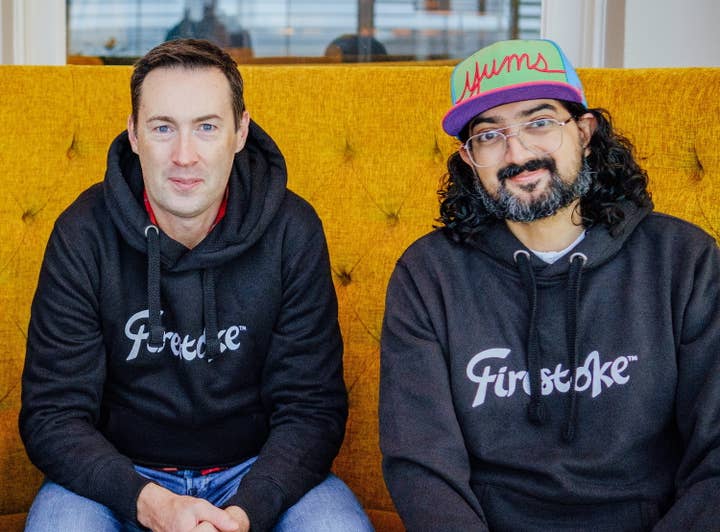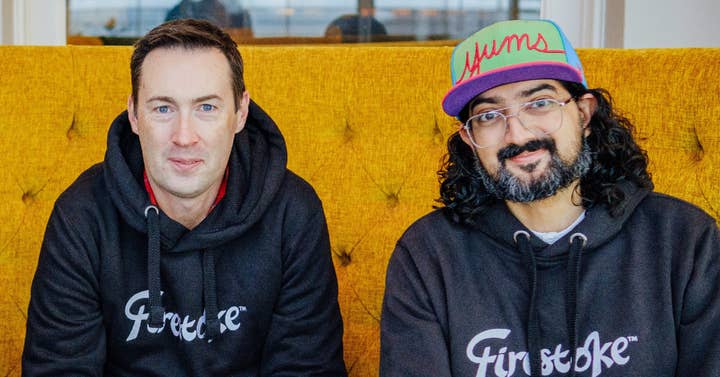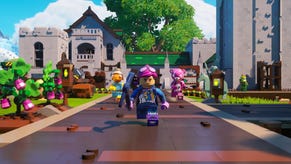How Firestoke wants to redefine publishing, one non-violent game at a time
Co-founder Paul Farley discusses how the new UK-based indie publisher aims to fix the developer/publisher relationship
Since his debut in the games industry in 1994, Paul Farley has had a successful and fulfilling career.
One of the three designers for the original Grand Theft Auto at DMA Design (which was soon to become Rockstar North), Farley went on to be lead game designer on State of Emergency at the late VIS Entertainment.
A pioneer in the mobile space, he then spent five years at Digital Bridges (later known as I-play) before co-founding Tag Games in 2006, one of the first developers to make games for iPhone and iPad, and a continued success story to this day.
While remaining chairman at Tag Games, he went on to head live games management platform ChilliConnect in 2018, which was sold to Unity in September 2019. He remained at the company until 2020, and then asked himself the all-important question: What next?
"I was probably not quite old enough to retire yet," he tells GamesIndustry.biz with a smile. "Thinking about what really inspired me, I got together with a couple people from Tag and we talked about the areas and trends within the games industry that were really exciting to us.
"There's still this incredible opportunity for publishers, and particularly the types of publisher that we always wanted as a developer"
"And one of those areas was very much the indie PC and console space, where we felt a lot of the innovation and creativity within the industry were occurring at the moment. We asked ourselves the question: What could we bring to the table that would be different? What would be compelling?
"I don't think we started with the idea that we'd be building a publisher at all. It was really open for a couple of months. As we started to explore and look at data, and talk to other developers, it became really clear that there's still this incredible opportunity for publishers within this space, and particularly the types of publisher that we always wanted as a developer."
And that's how Firestoke came to be, co-founded by Farley and design director Omar Khalil, who previously worked at the likes of Sony, Exient and Tag Games, among others.
The new UK-based indie publisher is coming out of stealth today, keen to fix a publisher/developer relationship that's often unbalanced.
"Having been on the other side of the table in conversations with publishers, you're left a little bit wanting in terms of having clearly aligned goals, and in negotiating an equitable position rather than one [with] a fairly sizable power imbalance," Farley says.
"Most developers go into publisher/developer relationships being the smaller partner needing the publisher for funding and further things. And we felt that there was a great opportunity to disrupt that, do something a little bit different and offer a deeper level of publishing. And so that's the angle we're coming at, be more flexible, be more equitable, really looking to build long-term relationships rather than short-term transactions."

Farley points out that the increasing accessibility of tools such as Unity and Unreal has unlocked the ability for small teams of only a handful of developers to create "outstanding high quality" games.
"Although small content has never been greater, those small teams in the majority need wider skills, wider experience than just development, to make sure that their game has the best chance of success," he continues. "And discoverability is one of the key areas that we obviously address and we hopefully bring to the table as a publisher."
Within the indie space, there's also a specific type of games that Firestoke is after: joyful, positive games that do not feature violence.
"We're not going to be signing games that particularly target 14 to 24-year-olds," Farley says. "We're going to avoid the shooters, deep RPGs and similar experiences. We've said that combat is okay -- it's okay to have competitive elements within games, there's nothing necessarily wrong with that. But we want to steer clear of brutal violence.
"Nintendo kind of solved that problem for first-person shooters with Splatoon but that's not going to appeal to everyone just because the content suddenly changes -- you're shooting ink instead of bullets. I think there's always going to be people who want to have that experience of pretending to shoot people and cause physical violence.
"There's a whole part of the audience that is actually actively looking for games that have a positive effect on their mental health"
"So, for us, that's where the line is drawn -- no blood, no extreme violence. The fact is that there's a whole part of the audience that is actually actively looking for games that have a positive effect on their mental health. That doesn't necessarily mean that they'll exclude the ones that don't. But there's a growing audience of people actually saying 'Well, maybe this isn't good for me.' I certainly know that now as a 40-plus person with a family, I tend not to play a lot of violent games. I play games with my kids, with the family.
"So I'm looking at things that are a bit more positive, like Fall Guys, Human Fall Flat. They've got violence but it's comedic violence. We're actually really loving the amount of games that we're seeing that have really strong co-op modes in them. So rather than play against someone, you're playing with them, which is just completely different dynamics. I think we'll see that grow."
He jokes that he doesn't want to say that they're going for 'casual games' as it's a loaded term, but explains that Firestoke is looking for "lighter, more arcade, party genres and gameplay experiences."
"We love games that bring people together, so that can be couch co-op or could be online multiplayer," he continues. "We just love what's happened during the pandemic where people have come together and socialised within games, because they haven't been able to meet up in person. We want to continue to foster that and encourage players to do that in a positive way."
We mention the recent rise of wholesome games, embodied by a now regular staple of the indie space, the Wholesome Direct. While Farley doesn't necessarily reject the label, he says that Firestoke is coming at it from a slightly different angle.
"I think 'wholesome' is probably too tight a definition for us right now. It kind of implies laid back, chilled gameplay, and the games that we want to publish aren't just chilled and laid back. Thinking of a Venn diagram, wholesome certainly would be encompassed in what we want to do at Firestoke, but that wouldn't be the entirety of it."
The audience for this type of games is small, he continues, but it's growing. And he believes it will continue to grow due to their accessibility and the increasing number of people interested in the medium.
If you look at market data, a quarter of people that are playing games today started playing in the last three years"
"If you look at market data, a quarter of people that are playing games today started playing in the last three years. That's insane. The average age for a gamer now in Europe is 31, 32 years old. Fairly similar in North America. So the demographic is getting older, it's people in their thirties and forties now that are very much the core audience that we're targeting, and their kids.
"I think the one thing we can say is that wholesome as a label and as a movement is growing. It will continue to grow and that's really exciting. And we definitely will be overlapping into that space with some of the games that we will be publishing."
As already touched upon, establishing a trusting relationship with developers in an equitable way and with aligned goals is key to Firestoke's vision. Throughout the past few months of operating stealthily, the team has had the opportunity to refine these conversations and find the right partners.
"We've thought really deeply about our process and how we engage with developers," Farley says. "Quite often the publisher wants to sign games because the developer is already established, there's an audience, there's a market for that game, the developer is capable and everything else. But there really isn't much effort in terms of: do you see things in the same way? Are you culturally aligned? Do you share the same objectives?
"So we spent a good period at the start speaking to over a hundred developers and asking them: What do you actually need? And actually listening. In that process of listening to developers we thought 'Could we actually have that alignment conversation much earlier on?' And you know what, it just saved so much trouble!"
"In game development we talk about failure a lot and that's great, but I've seen success rip teams apart as well"
He adds that both developers and publishers often go into negotiating deals with expectations that aren't verbalised or clearly communicated, and those expectations often are unrealistic or aren't aligned, which makes the process more difficult than it needs to be.
"Game development is hard, so that understanding is really important to establish very early on. That's something you don't really think about a lot in small companies: what is success and planning for success? In game development we talk about failure a lot and that's great, but I've seen success rip teams apart as well, so it's making sure that we're well prepared for all eventualities.
"That's a really refreshing, honest, open, and transparent conversation to have. And what it does mean is that very quickly you can establish if there is misalignment."
Firestoke has already signed two unannounced projects -- both will have proper launch campaigns when the time comes so Farley can't talk specifics. One is still in prototype phase, but Farley says he really believes in the small team developing it. The other project comes from "a single developer who's worked in this industry for a long time" and is far more advanced in its development.
When talking about the projects Firestoke is excited about more generally, Farley adds that he doesn't want to be too prescriptive about it.
"We're taking a talent-first approach and what that means is we're really looking at the team over the game concept in many cases. Every game, every developer is unique, we need to remain flexible. And again, it comes down to listening. And sometimes there is alignment, sometimes it fits our portfolio plan, and sometimes it doesn't. But we've got a very clear idea in terms of what we want as an identity."

And part of that identity is an ambition to go far without getting big.
"I can say very clearly that our ambition is not to build a huge corporation with Firestoke," Farley continues. "What I love -- and what the rest of the team loves -- is working with a small core team and keeping that family atmosphere where everyone knows each other and knows how to work well with each other.
"It was great working with Unity, which has more than 4,000 employees now. But our ambition is very much to follow in the [footsteps] of someone like Devolver who built a billion dollar business with a core team of [around] 35 people. That's incredible. That, to me, is one of the huge appeals now in a sort of post-pandemic world: folk can work in very small teams, they can work remotely, they can work from home and they can build incredible products. They don't need to have 100 people in an office somewhere, which is incredibly freeing. It means that we can focus on hiring the right talent for us regardless of where those people are globally. It knocks down a huge amount of barriers."
Farley is based in Scotland, while the rest of the Firestoke team is in England, and he says that it's been challenging over the years to run companies from Scotland and trying to attract talent there.
"[Teams] don't need to have 100 people in an office somewhere, which is incredibly freeing"
"That's always difficult, but when I speak to friends, they've been running studios, working out the locations, it's also been challenging for them as well. So freeing ourselves of having to attract people to a location is really good."
Concluding our chat, Farley reiterates how important flexibility is to Firestoke's vision, and how he's hoping to bring some of what he learnt in the mobile space to the indie console and PC space.
"Not that we're gonna transplant the [mobile] business model because we're not going to do free-to-play at all, but I think there's a lot of learning in terms of the use of data.
"Mobile hypercasual as well -- [that] ability to test and experiment around different game ideas and concepts before you actually build the game, that's really exciting. So we have some interesting ideas that, as we grow and develop, we want to test out just in terms of how we can increase our hit rate, how we deliver the games our audience wants and try not to get it wrong and deliver them stuff they don't want.
"There's an opportunity to work with incredibly creative developers that are producing incredible content, but also empowering them by giving them -- hopefully -- access to relatively accurate data that will help inform their game design decisions."
He highlights the lack of access to behaviour data in the console and PC sector compared to mobile, saying that even the basics of putting together commercial projections is very difficult because there isn't a lot of accurate data available.
"That's something that certainly needs to be addressed. Now, we're not going to spin another analytics and technology company just to look at that space, but I'd love to see more data being available on PC and console, and that requires the hardware manufacturers to open up a little bit. We shouldn't be afraid of that.
"It can be very empowering. And in a world where there's so many games being launched, particularly on Steam, discoverability is hard, and you can use data to get that advantage, so why wouldn't you?"






.jpeg?width=291&height=164&fit=crop&quality=80&format=jpg&auto=webp)


.jpg?width=291&height=164&fit=crop&quality=80&format=jpg&auto=webp)